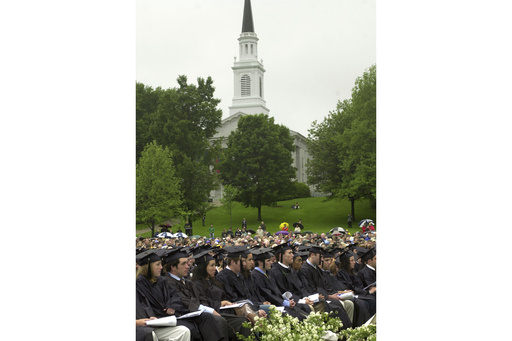A private liberal arts institution based in Vermont, which recently altered the name of its chapel due to connections with eugenics, will not be mandated to revert to the original title, following a decision made in a lawsuit directed at the institution.
In 2021, Middlebury College declared that it had removed John Mead’s name from the chapel because of his significant involvement in early 20th-century eugenics policies, which were aimed at isolating and preventing the reproduction of individuals deemed as “delinquents, dependents, and defectives.” On October 3, a court ruled that while the college is not required to restore the original name, the case can still advance to a jury trial to address damages related to other claims, as shared by former Governor James Douglas, who is serving as the special administrator for Mead’s estate.
Douglas initiated a breach of contract lawsuit in 2023 against his alma mater, alleging the institution engaged in what he described as cancel culture when it decided to take down Mead’s name from the building, which is now known as Middlebury Chapel.
John Mead, a physician and businessman who graduated from Middlebury in 1864, held the office of Vermont governor from 1910 to 1912. The chapel, carrying his name for over a century prior to its removal in 2021, remained unchanged even after his death in 1920, according to the ruling by Superior Court Judge Robert Mello.
The judge noted, “Governor Mead provided the majority of funds for the initial construction of the chapel, yet he did not allocate funds for its ongoing maintenance. Middlebury has determined that the appropriate time has come for a name change.” Mello concluded that the reasonable duration for any contractual obligation regarding the chapel’s name had been fulfilled.
Middlebury College expressed satisfaction with the court’s resolution regarding the main concerns raised by the estate. School representatives indicated that their legal team is assessing the next steps to address the few remaining issues in order to bring the case to a conclusion.
Douglas, who also teaches at Middlebury on a part-time basis, expressed his disappointment. He remarked, “The college could certainly rectify this situation at any time. They should recognize that their actions have tarnished the legacy of a generous benefactor who deeply cared for Middlebury College.”
The motivation for the name change came after the Vermont Legislature issued an apology in May 2021 for the harm caused by state-sanctioned eugenics policies and practices that resulted in sterilizations. Middlebury College is not alone in this movement; other academic institutions have also reassessed names associated with eugenic support.
For instance, in 2019, the departing president of the University of Vermont issued an apology for the institution’s participation in eugenics research from the 1920s to the 1930s, which had a role in the sterilizations. Additionally, the university had previously removed a former school president’s name from a library in response to his endorsement of the Eugenics Survey of Vermont and its leader, a professor at the university.
In 1914, Mead and his wife donated $74,000 to construct a chapel situated at a significant elevation on campus, according to Middlebury officials. Two years earlier, they stated that Mead had vigorously advocated for eugenics-based legislation.
Douglas explained that Mead selected the name Mead Memorial Chapel to honor his heritage. He contended, “The foundation of the college’s decision is fundamentally flawed.”
The outstanding concerns that will be addressed during the trial include whether the donation fell under a gift or a contractual obligation that Middlebury breached unfairly and, if so, what kind of damages the estate should receive.


